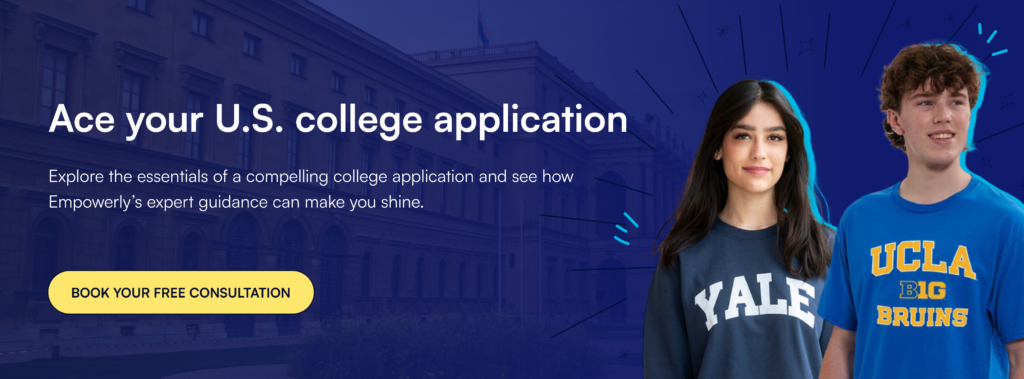Summer Matters More Than You Think
Summer break in high school isn’t just a vacation anymore. These days, it’s also a secret weapon — especially for students targeting top 20 or top 50 universities. If that’s your student’s goal, this is a conversation you can’t afford to skip.
The most competitive college applicants? They aren’t just relaxing by the pool. Instead, they’re spending their summers conducting research in university labs, sharpening leadership skills at elite pre-college programs, or launching nonprofit initiatives in their communities.
That’s why our team at Empowerly created a free, expert-backed guide to help families like yours make sense of the high school summer programs landscape. The whole process can be overwhelming — but with the right tools, you can turn summer into a strategic advantage. Whether your student dreams of medicine, engineering, creative writing, or public policy (or maybe just isn’t quite sure yet), this guide provides a roadmap for making the most of those pivotal weeks.
Today, we’ll break down the landscape of high school summer programs and explain what you need to know. Eager to skip ahead? Download the free guide now and unlock proven strategies to help your student use summer to stand out.
Why It’s Worth Your Attention
Here’s the truth. If you’re aiming for a top-tier college, it’s not enough to show up for class and get good grades. So, what else is there?
As families of high school students ourselves, we get it: during the regular year, your schedule is already packed. And it should be — being a teenager comes with plenty of pressure on its own, and academic success is the priority while you’re taking classes. But what you do on your own (especially when no one is requiring it) can speak volumes to admissions officers.
Here’s the key insight: Summer is one of the only moments in high school when students have extended free time, flexibility, and the chance to pursue interests in a deeper, more focused way. Selective colleges look for students who seize those golden opportunities with curiosity and intention.
In other words, these selective college admissions committees are looking for students who demonstrate extraordinary personal qualities outside of the classroom, too. One of the best ways to signal these traits is to choose to spend your free time in an enriching, challenging, or community-driven environment.
This isn’t about boosting your resume or chasing prestige for prestige’s sake. It’s about discovering purpose, developing your strengths, and building a personal story that admissions readers will remember.
What Exactly Are Competitive High School Summer Programs?
What are we dealing with, exactly? Let’s break it down.
Competitive summer programs are selective academic or enrichment experiences designed for high-achieving students. These might take place at top universities, through government or nonprofit organizations, or in prestigious research and internship settings.
What sets them apart is the admissions process. These programs often require:
- Essays or personal statements
- Transcripts or test scores
- Teacher recommendations
- Interviews or portfolios (for some programs)
There is still a wide variety of programming to choose from. Some of these programs are tuition-free and fully funded. Others come with a price tag, but offer generous financial aid. And some, while still valuable, are more pay-to-participate than competitive.
If your head is already swimming, take a quick listen. Here is a video that offers a good overview of how to approach these high school summer programs:
There are a few different kinds of programs. Examples of top-tier programs you may have heard of include:
- Research Science Institute (RSI) at MIT: extremely competitive, <10% acceptance rate
- Stanford Institutes of Medicine Research (SIMR): extremely competitive, <10% acceptance rate
- California State Summer School for Mathematics and Science (COSMOS): moderately selective, 10-30% acceptance rate
- LaunchX at MIT for young entrepreneurs: moderately selective, 10-30% acceptance rate
- Stanford University Mathematics Camp (SUMaC): moderately selective, 10-20% acceptance rate
There are also open-enrollment pre-college programs offered by top colleges, local coding camps, and more. However, these are considered less selective due to the open-access enrollment.
So why all the hype? Well, it’s deserved. These programs help students:
- Deepen subject-matter expertise
- Try new things
- Develop original research or projects
- Gain access to mentorship and advanced coursework
- Strengthen their admissions narrative or “hook”
- Expand their comfort zone
- Network with like-minded peers
- And more!
And yes — colleges take notice. Many alumni of these programs go on to attend Ivy League and top 20 schools. That’s no accident; these students are exemplary.
How to Choose the Right Summer Program for You
Here’s what many students get wrong: They assume they have to attend the most selective, most prestigious program possible. But the best high school summer programs are the ones that align with your interests, goals, and values — not just provide name recognition or clout. In this way, choosing a summer program is a lot like finding your best-fit college.
At Empowerly, we walk through the key factors every student should consider, including:
- Subject focus: STEM, humanities, arts, public service, or entrepreneurship
- Program type: Residential, commuter, virtual, internship-based, or research-oriented
- Cost and aid: Are there scholarships or stipends available?
- Instructor quality and ratio: Will you be learning from university faculty or industry professionals?
- Time commitment: Can you manage the length and location without disrupting family or school plans?
One pro tip? Look for thematic consistency. If you already have an intended major or interest area, use summer to explore it further. That shows intentionality, and it creates powerful essay material down the line.
When to Start Planning
If you’re starting early, here’s the ideal timeline for planning an awesome summer.
- Fall (September – November): research programs and discuss your student’s potential interests
- Winter (December – February): prepare your application materials like essays, letters of recommendation, and more
- Spring (March – April): apply to back-up programs and plan any logistical loose ends
- Summer: participate, journal about your experiences, and reflect on your insights for your college applications!
What If You Don’t Get In? Your “Plan B” Can Still Shine
The most competitive programs are, by definition, tough to access. Acceptance rates for some can dip below five percent. A few are even more selective than the universities that host them.
But that doesn’t mean all is lost.
In fact, many of the most impactful summer experiences don’t require a formal application at all. What matters is that you take initiative, seek out meaningful challenges, and stay curious. Here are some high-value alternatives you’ll find inside our guide:
- Conduct independent research with a professor or graduate student
- Take online college classes to earn credit and explore subjects
- Launch a personal project like a blog, podcast, app, or business idea
- Volunteer locally or start your own community initiative
- Work a summer job to gain real-world skills and independence
- Shadow a professional in a field you’re curious about
- Visit colleges virtually or in person to learn more and demonstrate interest
Don’t limit yourself. Each of these activities signals maturity, intellectual vitality, and initiative—qualities that colleges admire just as much as any program name.
Inside the Guide: What You’ll Learn
This isn’t just a list—it’s a comprehensive playbook. In this guide, you’ll discover:
- A curated selection of top competitive summer programs for high school students
- Key deadlines, locations, costs, and competitiveness breakdowns
- Strategies for building an application that stands out
- How to balance productivity and rest during summer
- Tips for reflecting on your experiences to support future college essays
This guide was written by expert college counselors who have helped thousands of students earn admission to the nation’s most selective schools. It’s packed with actionable advice and hard-to-find insights that will save you time—and give you a competitive edge.
Get your free copy now and take control of your summer game plan.

What’s next?
Here are some key points to keep in mind while you rock your summer plans, so you can leverage the experience more fully:
- Keep a journal during your program with observations, breakthroughs, or doubts.
- Note specific challenges you overcame — especially interpersonal or intellectual ones.
- Ask yourself: What surprised me? What skills did I grow?
- Later, revisit this journal when writing your Common App essay or UC PIQs.
Looking for More?
Regardless of their interests or starting point, Empowerly provides a broad range of personalized services to help students get the most out of their summers. Students can find and engage in high-impact summer activities that complement their long-term objectives with the help of our extracurricular guidance.
Our knowledgeable counselors assist each student in creating a purposeful and well-thought-out summer plan, whether that involves applying to competitive research programs, locating internships, starting separate projects, or obtaining volunteer opportunities.
Students are equipped to stand out from the crowd and use summer as a launching pad for future success with the help of Empowerly’s unique program database, insider admissions insights, and one-on-one mentorship.

Start Early, Dream Big, and Plan Smart
Summers in high school fly by — but their impact can last a lifetime. The students who rise to the top of the applicant pool are the ones who use every opportunity — including summer — to explore, grow, and lead.
Whether you’re targeting Ivy League schools or just want to build confidence and experience, our free guide to competitive summer programs will set your student up for success. With intention, creativity, and a bit of expert guidance, you can transform your summer into a powerful foundation for college and beyond.
Download the guide now and get ahead of the game — because the best summers don’t happen by accident.
Don’t Let Summer Be a Missed Opportunity!
If you want your college application to stand out, your summer planning starts now. Empowerly’s free guide to competitive high school summer programs is a powerful first step. Combine it with our one-on-one counseling services and insider tools, and you’ll be ready to make this summer count — for more than just fun in the sun.
Don’t wait. Our college counselors are the best-rated in the country and have proven to improve college admission rates by 11x. Download the guide and book a free consultation to get started today!
